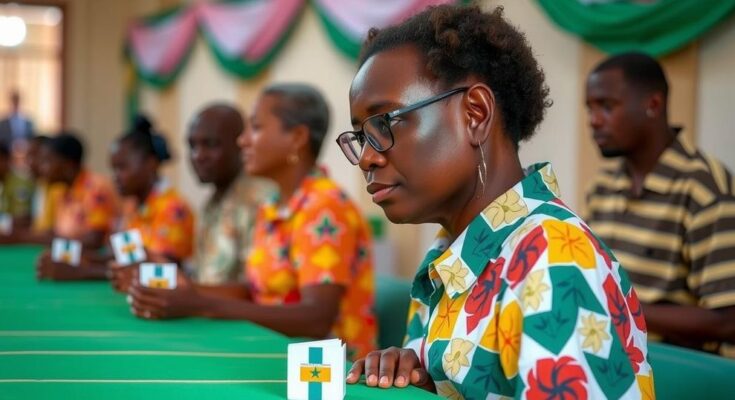Ghana’s presidential and legislative elections commenced on Saturday amid an economic crisis, with 18.7 million voters choosing between Vice President Mahamudu Bawumia and former President John Dramani Mahama. The elections are seen as a pivotal moment for democracy, reflecting widespread public discontent due to high inflation and unemployment. Key issues include promises for economic recovery and the impact of illegal gold mining. Voter sentiment indicates a strong belief that the nation is on the wrong path, with 82% expressing concern over the country’s direction.
On Saturday, polls opened in Ghana for presidential and legislative elections amidst a significant economic crisis that casts doubts on the political future of the nation. Approximately 18.7 million registered voters will choose between Vice President Mahamudu Bawumia of the ruling New Patriotic Party (NPP) and former President John Dramani Mahama of the opposition National Democratic Congress (NDC). Despite the presence of 12 candidates, the election is characterized as a two-person race, similar to previous elections since the reintroduction of multiparty politics in 1992.
Ghana has historically been viewed as a pillar of democratic governance in West Africa, recognized for its peaceful electoral processes. However, the nation currently faces high inflation and widespread unemployment, leading to public discontent. A recent poll indicated that 82% of Ghanaians feel their country is proceeding in an unfavorable direction, reflecting a broader disillusionment with the political landscape.
In their concluding campaign rallies, both candidates addressed the nation, presenting their visions for economic recovery. Mr. Bawumia, an economist and former deputy governor of the central bank, promised continuity in government policies to stabilize the economy. Conversely, Mr. Mahama asserted that it is vital to “reset our democracy, governance, economy, finances, agriculture, infrastructure, environment, health sector and all that we hold dear as a people.”
Despite a spirited atmosphere surrounding the elections with vibrant rallies and displays, the pallor of economic hardship looms large. Ghana has recently defaulted on significant foreign debts, with inflation peaking at 54%, affecting the affordability of everyday goods for citizens. Additionally, illegal gold mining, driven by job scarcity, remains a pressing issue, contributing to environmental degradation.
As the election unfolds, concerns about the country’s economic trajectory are central to the discourse, underscoring the critical challenges faced by Ghana in its pursuit of sustainable development and democratic integrity.
Ghana has long been regarded as a stable democracy within Africa, especially in a region troubled by political upheaval and violence. This election comes at a crucial juncture as the country grapples with its worst economic crisis in decades. Amidst high inflation and job shortages, voter sentiment indicates a widespread belief that the nation is moving in the wrong direction. The situation raises critical questions about the candidates’ platforms and their capacity to effectively address these economic challenges in a deeply polarized political environment.
In conclusion, Ghana’s elections symbolize a crucial moment for the nation, as citizens navigate a landscape marked by economic instability while seeking effective political leadership. With Vice President Bawumia and former President Mahama emphasizing differing visions for the future, the potential for political transformation hinges on voters’ responses to an ongoing economic crisis. The elections will not merely reflect the political affiliations of Ghanaians but also their urgent desire for substantial and effective governance amid adversity.
Original Source: www.voanews.com




